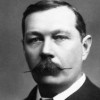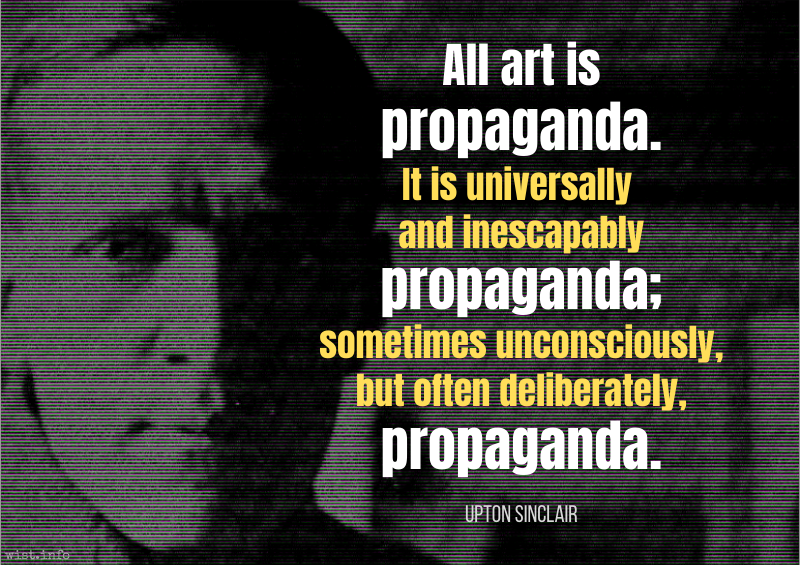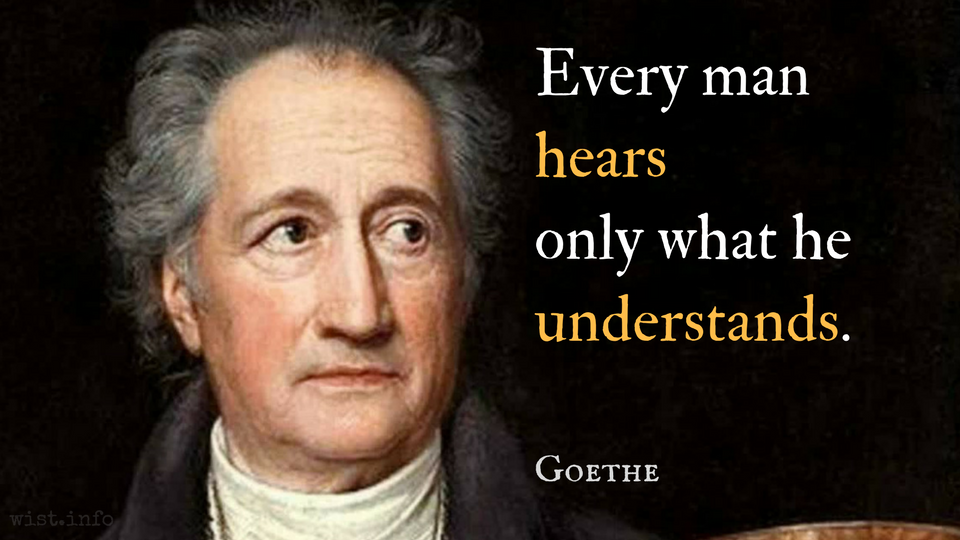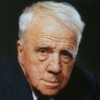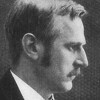It was one Sunday evening early in September of the year 1902 that I received one of Holmes’s laconic messages: “Come at once if convenient — if inconvenient come all the same. — S. H.”
Arthur Conan Doyle (1859-1930) British writer and physician
Story (1923-03), “The Adventure of the Creeping Man,” The Strand Magazine, Vol 65
(Source)
Quotations about:
message
Note not all quotations have been tagged, so Search may find additional quotes on this topic.
Link to this post | No comments
Topics: convenience, imposition, inconvenience, message, summons
More quotes by Doyle, Arthur Conan
When you let money speak for you, it drowns out anything else you meant to say.
Mignon McLaughlin (1913-1983) American journalist and author
The Second Neurotic’s Notebook, ch. 9 (1966)
(Source)
Link to this post | No comments
Topics: affluence, communication, message, money, ostentation, self-expression, wealth
More quotes by McLaughlin, Mignon
The ways of dead people are not our ways. They have a very oblique way of expressing themselves, and often they’ll tell you something that can be interpreted many ways; it gives them a way out while preserving their reputation for infallibility.
S. P. Somtow (b. 1952) Thai-American music composeer, conductor, author [Somtow Papinian Sucharitkul; สมเถา สุจริตกุล; Somthao Sucharitkun]
“Lottery Night,” World Fantasy Convention Program Book (1989-10)
(Source)
Collected in Gardner Dozois, ed., Year's Best Science Fiction 7 (1990) and Somtow, Dragon's Fin Soup (1998).
Link to this post | No comments
Topics: dead, ghost, infallibility, message, misinterpretation, oracle, spirit, supernatural, vagueness, warning
More quotes by Somtow, S. P.
Every book is, in an intimate sense, a circular letter to the friends of him who writes it. They alone take his meaning; they find private messages, assurances of love, and expressions of gratitude, dropped at every corner. The public is but a generous patron who defrays the postage.
Robert Louis Stevenson (1850-1894) Scottish essayist, novelist, poet
Travels with a Donkey in the Cévennes, Dedication to Sydney Colvin (1879)
(Source)
Link to this post | No comments
Topics: author, book, easter egg, friends, message, writer, writing
More quotes by Stevenson, Robert Louis
The world is a book, and those who do not leave home read but one page.
Augustine of Hippo (354-430) Christian church father, philosopher, saint [b. Aurelius Augustinus]
(Spurious)
This quotation, and variants, are widely attributed to Augustine, but, though he did on occasion write of the world as a a text or book, it was not in the sense of encouraging travel (which Augustine did not like), but in the sense that anyone could read the message of God in the world around them, even if they could not read Scripture itself. For example in Exposition of the Psalms [Enarrationes in Psalmos] on Psalm 45, sec. 7 (v. 4), he writes:The page of divine scripture is open for you to read, and the wide world is open for you to see. Only the literate can read the books, but even the illiterate can read the book of the world.
[tr. Boulding (2000)]
May the sacred page be a book for you, so that you may hear, may the globe of the earth be a book for you, so that you may see; in these books only those who know letters read these things; in the whole world, even the fool can read.
[tr. Mews (2004)]
[Liber tibi sit pagina diuina, ut haec audias; liber tibi sit orbis terrarum, ut haec uideas. in istis codicibus non ea legunt, nisi qui litteras nouerunt; in toto mundo legat et idiota.]
If this was the source of the original quote -- which begins to show up in English in the late 18th Century -- it was significantly distorted. Early appearances of the version we know today:The world is a great book, and none study this book so much as a traveler. They that never stir from their home read only one page of this book.
[ed. Feltham, The English Enchiridion (1799), paraphrasing]The world is a great book, of which they that never stir from home read only a page.
[ed. Fiedling, Select Proverbs of All Nations (1824)]
It is in turn possible that Augustine's "world is a book" metaphor was somehow conflated with this original expression in Fougeret de Monbron, Le Cosmopolite (opening words) (1750):The universe is a sort of book, whose first page one has read when one has seen only one's own country.
[L'Univers est une espece de livre dont on n'a lû que la prémiére page, quand on n'a vû que son Païs.]
More discussion:
Link to this post | No comments
Topics: book, demonstration, explication, God, message, revelation, travel, world
More quotes by Augustine of Hippo
Children are the living messages we send to a time we will not see.
Neil Postman (1931-2003) American author, media theorist, cultural critic
The Disappearance of Childhood, Introduction (1982)
(Source)
Often misattributed to John W Whitehead (b. 1946) American lawyer, conservative activist, author. The same line appears, unattributed, in Whitehead's The Stealing of America, ch. 10 (1983); elsewhere in there Whitehead references Postman's book, so it is likely he took the line from Postman.For more discussion of this, see Lance Strate's Blog Time Passing: Children are the Living Messages We Send to a Time We Will Not See.
Link to this post | No comments
Topics: children, future, legacy, message, posterity
More quotes by Postman, Neil
Dissents speak to a future age. It’s not simply to say, “My colleagues are wrong and I would do it this way.” But the greatest dissents do become court opinions and gradually over time their views become the dominant view. So that’s the dissenter’s hope: that they are writing not for today but for tomorrow.
Ruth Bader Ginsburg (1933-2020) American lawyer and jurist, Supreme Court Justice (1993-2020)
“Ruth Bader Ginsburg and Malvina Harlan,” interview by Nina Totenberg, NPR (2002-05-02)
(Source)
Speaking of Justice John Marshall Harlan and his lone dissent in Civil Rights Cases, 109 U.S. 3 (1883), where the Supreme Court struck down the Civil Rights Act of 1875. Ginsburg was being interviewed for her role in getting a long-lost memoir by Malvina Harlan, the Justice's wife, published as a book.
Link to this post | No comments
Topics: court, disagreement, dissent, evolution, future, influence, justice, message, posterity, supreme court
More quotes by Ginsburg, Ruth Bader
It is enough that the language one uses gets the point across.
[辭、達而已矣]
[辞达而已矣]Confucius (c. 551- c. 479 BC) Chinese philosopher, sage, politician [孔夫子 (Kǒng Fūzǐ, K'ung Fu-tzu, K'ung Fu Tse), 孔子 (Kǒngzǐ, Chungni), 孔丘 (Kǒng Qiū, K'ung Ch'iu)]
The Analects [論語, 论语, Lúnyǔ], Book 15, verse 41 (15.41) (6th C. BC – AD 3rd C.) [tr. Lau (1979)]
(Source)
Currently identified as 15.41; older sources use the Legge numbering, as noted below. (Source (Chinese) 1, 2). Alternate translations:In language it is simply required that it convey the meaning.
[tr. Legge (1861), 15.40]In speaking, perspicuity is all that is needed.
[tr. Jennings (1895)], 15.40]Language should be intelligible and nothing more.
[tr. Ku Hung-Ming (1898), 15.40]In language, perspicuity is everything.
[tr. Soothill (1910), 15.40]Words should be used simply for conveying the meaning, ornateness is not their aim.
[tr. Soothill (1910), alternate. 15.40]Problem of style? Get the meaning across and then STOP.
[tr. Pound (1933), 15.40]In official speeches all that matters is to get one's meaning through.
[tr. Waley (1938), 15.40]Expressiveness is the only principle of language.
[tr. Lin Yutang (1938)]It is enough that one’s words express fully one’s thought.
[tr. Ware (1950)]In words, the purpose is simply to get one's point across.
[tr. Dawson (1993)]Words are merely for communication.
[tr. Leys (1997)]As long as speech conveys the idea, it suffices.
[tr. Huang (1997)]It is enough that the words can express the meanings.
[tr. Cai/Yu (1998), #425]In expressing oneself, it is simply a matter of getting the point across.
[tr. Ames/Rosemont (1998)]The words should reach their goal, and nothing more.
[tr. Brooks/Brooks (1998)]Language is insight itself.
[tr. Hinton (1998)]Words should convey their point, and leave it at that.
[tr. Slingerland (2003)]With words it is enough if they get the meaning across.
[tr. Watson (2007)]The sole purpose of a language is to communicate messages and ideas. That is all.
[tr. Li (2020), 15.42]
Link to this post | No comments
Topics: clarity, communication, intent, language, meaning, message, words
More quotes by Confucius
Once abandon that firm ground, once plead that history has a “message” or that history has a “social responsibility” (to produce good Marxists or good Imperialists or good citizens) there is no logical escape from the censor and the Index, the OGPU and the Gestapo.
A. J. P. Taylor (1906-1990) British historian, journalist, broadcaster [Alan John Percivale Taylor]
“The Historian,” Manchester Guardian (5 Aug 1938)
(Source)
Link to this post | No comments
Topics: history, message, purpose, truth
More quotes by Taylor, A. J. P.
All art is propaganda. It is universally and inescapably propaganda; sometimes unconsciously, but often deliberately, propaganda.
As commentary on the above, we add, that when artists or art critics make the assertion that art excludes propaganda, what they are saying is that their kind of propaganda is art, and other kinds of propaganda are not art. Orthodoxy is my doxy, and heterodoxy is the other fellow’s doxy.
Upton Sinclair (1878-1968) American writer, journalist, activist, politician
Mammonart, ch. 2 “Who Owns the Artists?” (1925)
(Source)
Link to this post | No comments
Topics: art, culture, message, music, norms, painting, propaganda, writing
More quotes by Sinclair, Upton
Every great work of art has two faces: one toward its own time and one toward the future, toward eternity.
Daniel Barenboim (b. 1942) Argentine-Israeli pianist and conductor
Quoted in the International Herald Tribune (20 Jan 1989)
The above is sometimes cited to his collaborative dialog with Edward Said, Parallels and Paradoxes (2002), but the passage there is slightly different: "I think that every great work of art has two faces: one toward its own time and one toward eternity."
Link to this post | No comments
Topics: art, context, future, history, message, perspective, present, understanding
More quotes by Barenboim, Daniel
Link to this post | No comments
Topics: message, narrative, pain, silence, suffering
More quotes by Hurston, Zora Neale
Language exerts hidden power, like the moon on the tides.
Rita Mae Brown (b. 1944) American author, playwright
Starting from Scratch, Part 3 “The Work,” “The Passive Voice, or The Secret Agent” (1989)
(Source)
Link to this post | No comments
Topics: influence, language, message, power, propaganda, words, writing
More quotes by Brown, Rita Mae
Every man hears only what he understands.
[Es hört doch jeder nur, was er versteht.]
Johann Wolfgang von Goethe (1749-1832) German poet, statesman, scientist
Sprüche in Prosa: Maximen und Reflexionen [Proverbs in Prose: Maxims and Reflections] (1833) [tr. Saunders (1893), “Life and Character,” #383]
(Source)
Posthumous, on "Literature and Life." (Source (German)). Alternate translations:A man hears only that which he understands.
[tr. Rönnfeldt (1900)]For surely everyone only hears what he understands.
[tr. Stopp (1995), "Posthumous," #887]
Link to this post | No comments
Topics: communication, comprehension, conversation, hearing, listen, listening, meme, message, perspective, reality, subjectivity, understanding
More quotes by Goethe, Johann von
Link to this post | No comments
Topics: bore, chatter, expression, inarticulate, meaning, message, natter, silent, speech, stifled, talk
More quotes by Frost, Robert
They say you shouldn’t shoot the messenger, but no one warns you how much you’ll want to.
Link to this post | No comments
Topics: bad news, message, messenger, punish
More quotes by Adams, Scott
Link to this post | No comments
Topics: author, interpretation, meaning. theme, message, writing
More quotes by Brooks, Thomas
Consider not so much who speaks, as what is spoken.
Thomas Fuller (1654-1734) English physician, preacher, aphorist, writer
Introductio ad Prudentiam, Vol. 1, # 109 (1725)
(Source)
Link to this post | No comments
Topics: message, messenger, speaker, speaking, speech, truth
More quotes by Fuller, Thomas (1654)
Link to this post | No comments
Topics: boredom, focus, message, preaching, sermon, speech, succinctness, writing
More quotes by Twain, Mark
Eloquence which diverts our minds to itself is harmful to its subject.
[L’eloquence faict injure aux choses, qui nous destourne à soy.]Michel de Montaigne (1533-1592) French essayist
Essays, Book 1, ch. 26 (1.26), “Of the Education of Children [De l’institution des enfans]” (1579) [tr. Ives (1925)]
(Source)
First published in the 1580 edition.
(Source (French)). Alternate translations:That eloquence offereth injurie unto things, which altogether drawes us to observe it.
[tr. Florio (1603), ch. 25]That eloquence prejudices the subject it would advance, that wholly attracts us to itself.
[tr. Cotton (1686), ch. 25; Cotton/Hazlitt (1877)]That sort of eloquence which makes us in love with Ourselves, does an injury to the subject it treats of.
[alt. tr. Cotton (1686), ch. 25]The eloquence that diverts us to itself harms its content.
[tr. Frame (1943)]When eloquence draws attention to itself it does wrong by the substance of things.
[tr. Screech (1987)]
Link to this post | No comments
Topics: attention, distraction, diversion, eloquence, focus, language, message, style
More quotes by Montaigne, Michel de
Link to this post | No comments
Topics: author, message, subtext, subtlety, writing
More quotes by Smith, Logan Pearsall
But every writer, especially every novelist, has a “message”, whether he admits it or not, and the minutest details of his work are influenced by it. All art is propaganda. Neither Dickens himself nor the majority of Victorian novelists would have thought of denying this. On the other hand, not all propaganda is art.
Link to this post | No comments
Topics: art, message, polemic, propaganda, subtext, writing
More quotes by Orwell, George
Link to this post | No comments
Topics: eloquence, explanation, message, understanding
More quotes by Emerson, Ralph Waldo
Link to this post | No comments
Topics: cliche, election, message, party, politics, voters
More quotes by Gingrich, Newt
Link to this post | No comments
Topics: be quiet, divine guidance, guidance, listening, message, quiet, silence
More quotes by Emerson, Ralph Waldo
Link to this post | No comments
Topics: child, divine purpose, future, God, message, optimism
More quotes by Tagore, Rabindranath

